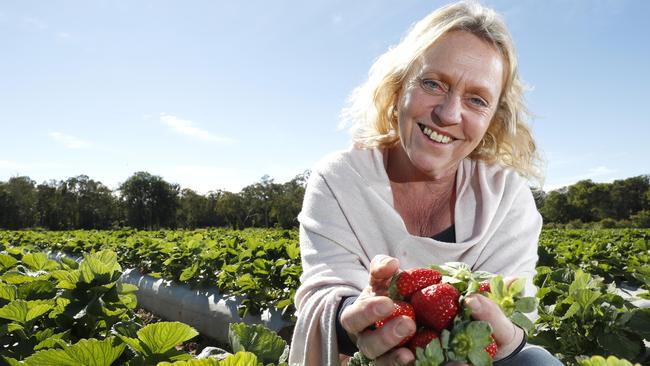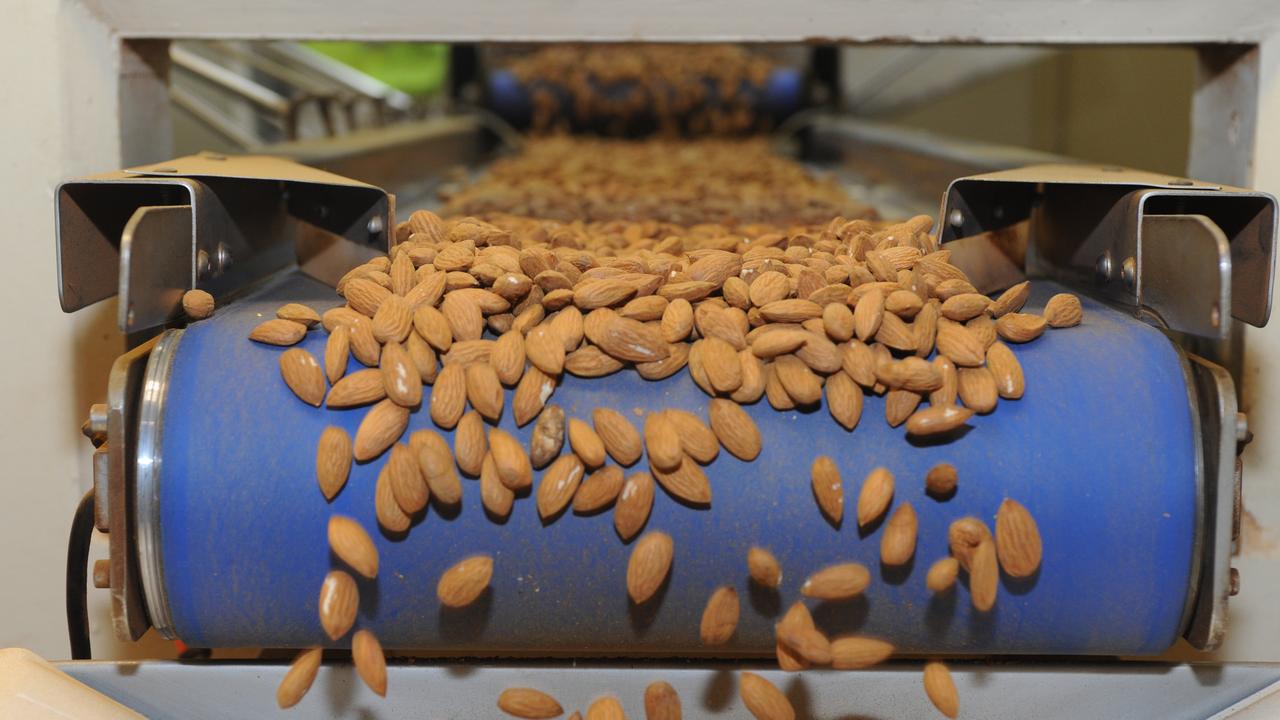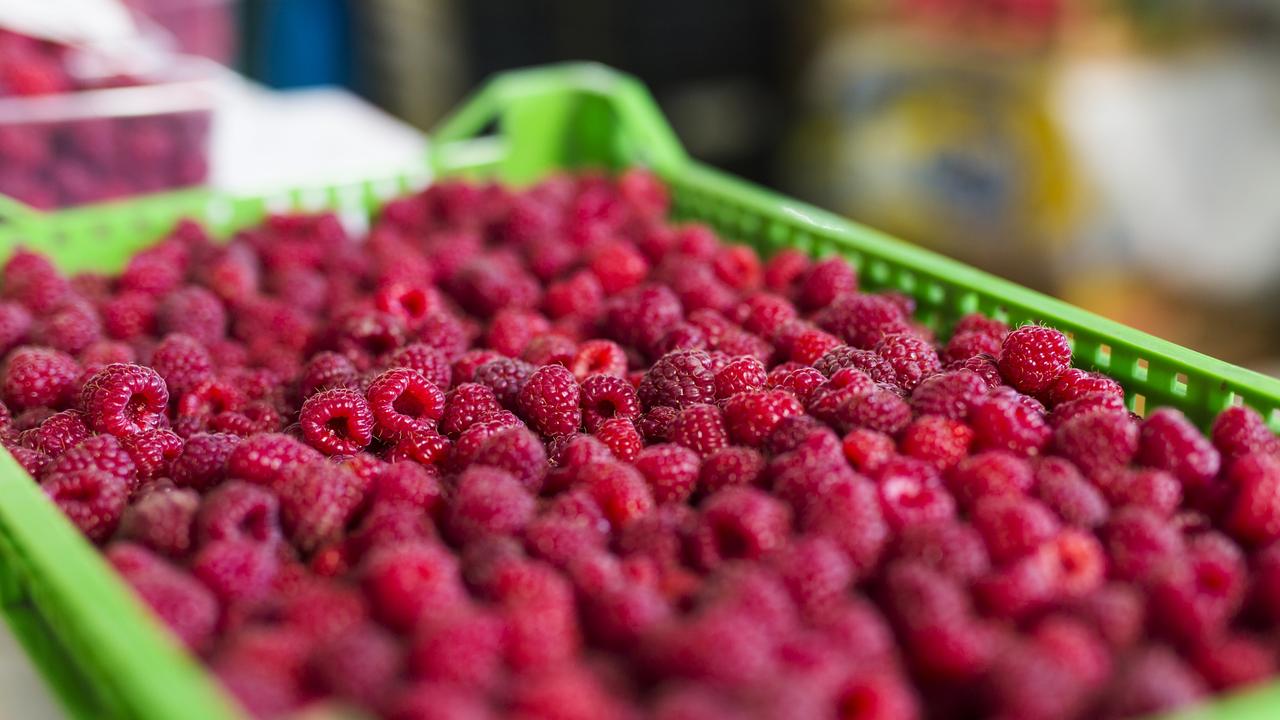Berry farming: Adrian and Mandy Schultz from Wamuran diversify to survive, thrive
Strawberry farming can be a tough gig, but Queensland growers Adrian and Mandy Schultz have diversified to stay afloat. Here’s how.

QUEENSLAND Strawberry Growers Association president Adrian Schultz does not mince his words.
“It used to be possible to make a reasonable income out of just growing strawberries,” Adrian said.
“But now it’s difficult to survive without diversification.
“It’s not such an attractive industry to get in to anymore.”
For 16 years Adrian and his wife Mandy have farmed strawberries on their 16ha property at Wamuran in Queensland, initially farming 30,000 plants, at the peak last year 200,000 and this year cutting it back to 120,000 across 2.5ha.
They yield about 1kg or four punnets per plant, with yields varying between their three varieties – ruby gem, scarlett rose and red rhapsody – and selling fresh fruit to wholesale markets along the eastern seaboard through their LuvaBerry and Bonza Berry brands.
“When we first started, 200,000 plants would have been considered a big farm, but a lot has changed since then,” Adrian said.
“Technological innovation, the advent of the working visa program and new varieties have allowed the expansion of big commercial growers.
“Since 2015 corporatisation has been ramping up and so now I’m competing in the same field as suppliers who have seven million plants.”
In parallel, he said, markets for weather-damaged and smaller fruit has diminished, leading to overproduction.
“In the past there have been avenues where you used to be able to send seconds to a cannery or processor to make jam, for instance. You wouldn’t make money, but they would buy at cost of recovery.
“But in recent years cheaper imported products have stopped that processing avenue.
“Like a lot of agricultural industries, we’ve had to adapt and adjust across the farm.”
To diversify, the couple have cut back strawberry production to grow herbs — thyme and sage — last year producing 800 bunches of each per week for the food services industry.
CLEARING HURDLES
THIS year was set to be the first for major commercial herb production, which was stymied on the back of COVID-19.
In addition Adrian and Mandy are growing finger limes, planted in stages over the past five years.
About 80 per cent of the crop was set to be exported this year, but again the pandemic has paused those shipments.
The Schultz family — including three children — have also aimed for a niche market in production, creating “fusion” farm management, “a combination of organic and conventional principles”.
“We tried organic entirely but found it difficult to grow at a commercial level,” Adrian said.
“So with this we use organic products and integrated pest management to reduce chemical use, but in the event of a weather event where we know we’ll have disease issues, we revert to low chemical use.”
For example, they use a biological spray for caterpillar control, Eco-Carb as an alternative to fungicide to control powdery mildew and Integrated Pest Management predator mites.
“Do we get a better price for our strawberries with fusion farming? No, not at the wholesale market, but at our farm gate we do.
“People buy our brands because they know it’s safer.”
Arguably the Schultz’s most innovative avenue of diversification has been value-adding of seconds strawberries, including small or damaged fruit, with Adrian estimating about 10 per cent of fruit is hit by rain or hail each year.
“Three years ago Mandy posted a video on Facebook showing all our small, damaged fruit dumped in drums.
She said “we’ve got to stop doing this, wasting this fruit”.”
The video struck a chord.
The result was her project, Our War On Waste, which has a following of about 7000 customers.
Rather than sell seconds at farmers’ markets, for instance, Mandy’s Our War On Waste has created a network of about 10 “ambassadors” in a radius of about 150km, stretching from Ipswich to the Darling Downs.
These “ambassadors” host Mandy in their driveways, which she has called “car park parties”.
CAR PARK PARTIES
THE 7000 followers are members of a closed Facebook chat group, who are notified of car park party dates; two weeks prior receiving an order form; then on the day turning up at the host’s house where Mandy distributes frozen strawberries in 1kg bags, kept cold in styrofoam boxes on the back of her ute.
“We made it up as we went along but basically it’s very easy,” she said.
“It’s just about 18 days a year, I blitz a suburb, stay in one location for an hour and I’m finished by 1pm.”
So successful were the frozen berries, Mandy quickly expanded to freeze-dried products, processed in Melbourne and sold as “crunch” whole strawberry snacks, or “dust” in glass jars.
She has also now taken on raspberry and blueberry seconds from two other farms, selling the frozen berries alongside her own, admitting that because they are seconds, strawberry yield can vary from as low as 250kg this year, up to 1.2 tonnes last year.
This year she has also expanded to online shop orders, as well as farmgate sales, planning to hold about seven farm days in 2021.
She said the event is more about agritourism, including farm tours.
Adrian said the value-add business had helped the bottom line, but was “marginal” because of its variability.
As president of the Queensland Strawberry Growers Association, QSGA represent-ative for Strawberries Australia and board member for the Australian Strawberry Plant Accreditation Authority, Adrian said this year the industry has been hit by pandemic labour shortages and government needed to step up to allow more workers.
He said the Stanthorpe area, with a season from October to May, already had growers killing plants because of lack of labour, which again underscored difficulties growers face.
“I love growing strawberries, but can I continue to be a grower? It’s getting harder and harder with a farm my size.”
MORE
FARMERS SOUND WARNING ON LABOUR SHORTAGE AS 20,000 BACKPACKERS FLEE
BLUEBERRY PRICES DROP AMID OVERSUPPLY IN NORTHERN NSW
MACQUARIE INFRASTRUCTURE AND REAL ASSETS GROUP MAKES $300M BID FOR VITALHARVEST FREEHOLD TRUST


